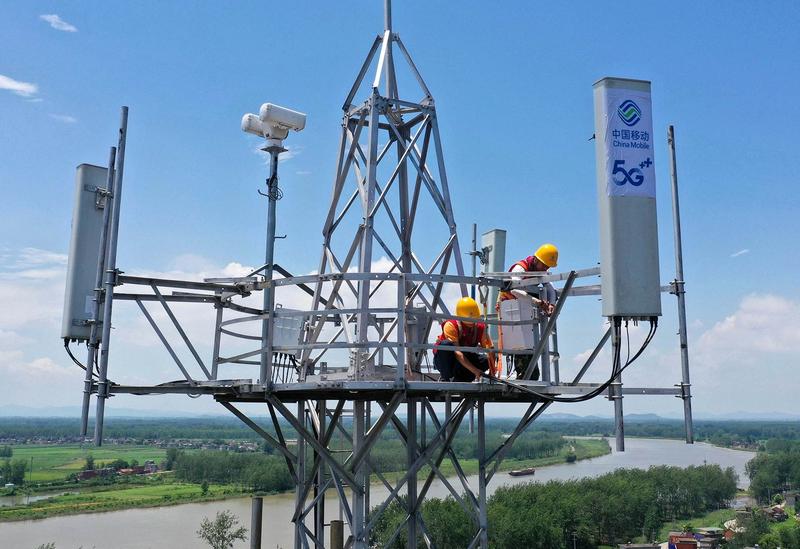Regulator's notice underlines rollout of 5G networks, smart digital tech
 China Mobile employees test a 5G base station in Tongling, Anhui province. (GUO SHINING / FOR CHINA DAILY)
China Mobile employees test a 5G base station in Tongling, Anhui province. (GUO SHINING / FOR CHINA DAILY)
China's top economic regulator on Tuesday unveiled a notice that detailed efforts to promote new urbanization during the 14th Five-Year Plan period (2021-25), which is expected to inject new vitality into economic growth and accelerate the nation's high-quality development.
The notice unveiled by the National Development and Reform Commission on its website said more efforts are needed to accelerate the rollout of 5G networks, ensure that the 5G signals will cover all cities and counties across the nation, and expand the coverage of the gigabit optical network.
Widening the application of digital technologies in more scenarios such as smart travel will also help spur consumption and accelerate the transformation of a slew of traditional industries.
Qin Hailin, president of the China Center for Information Industry Development Consultancy
The notice also called for more efforts to enrich the application scenarios of digital technologies, and promote the development of remote work, online education, telemedicine, smart travel, smart communities, smart buildings, smart business districts, smart security and other industries.
By the end of May, China had built 1.7 million 5G base stations, with the number of 5G mobile phone users reaching 428 million.5G traffic accounted for 27.2 percent of mobile traffic, data from the Ministry of Industry and Information Technology on Tuesday showed.
Moreover, 5G technologies have been applied to over 40 categories in the national economy. It has been widely used in more than 200 smart mines, more than 1,000 smart factories, more than 180 smart grid networks, 89 ports, and more than 600 hospitals across China, the ministry said.
Wang Zhiqin, deputy head of the China Academy of Information and Communications Technology, a government think tank, said building a sound telecom infrastructure will lay a sound foundation for the high-quality development of China's digital economy.
Previously, China's digital economy was chiefly driven by consumer-oriented internet applications like e-commerce, but now enterprise-oriented applications like industrial internet are playing a significantly bigger role, which showcases a better digital economic structure, Wang said.
She further said that the market size of China's digital economy reached 45.5 trillion yuan ($6.77 trillion) in 2021, up 16 percent year-on-year.
Qin Hailin, president of the Beijing-based China Center for Information Industry Development Consultancy, said the efforts to accelerate the construction of "new infrastructure" like 5G will help fuel investment in the second half of this year, contributing to the nation's economic recovery.
"Widening the application of digital technologies in more scenarios such as smart travel will also help spur consumption and accelerate the transformation of a slew of traditional industries," Qin said.
Currently, more than 2,400 "5G plus industrial internet" projects are under construction in China, as the nation beefs up its industrial upgrade drive that attempts to boost the marriage between digital technologies and traditional sectors.
Zhao Houlin, secretary-general of the International Telecommunication Union, said earlier that China's consumer internet and industrial internet have entered the fast lane, putting China among the leaders in global innovation and development.
To better pounce on the opportunity, the Ministry of Industry and Information Technology earlier unveiled the 2022 work plan for industrial internet, calling for efforts to build 10 factories that are fully covered by 5G, and cultivate about 10 industrial internet public service platforms in specific regions this year.


